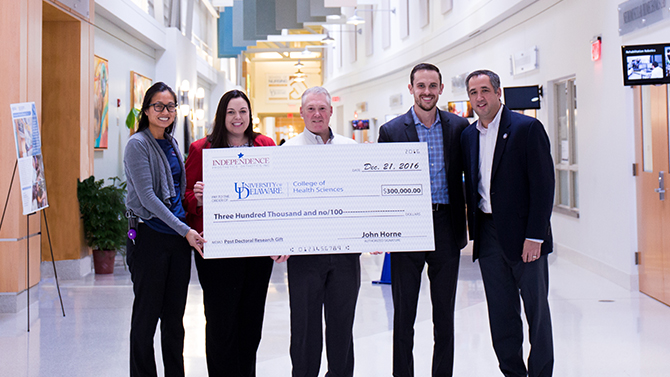


Powering up prosthetics research
January 13, 2017
Independence Prosthetics-Orthotics donation spurs prosthetics outcomes research
Like many areas within the convoluted world of health care, the orthotics and prosthetics industry faced changing regulations. And its patients felt the brunt of it. For people with limb loss, these changes sparked a need for better medical documentation.
In 2012, John Horne, president of Independence Prosthetics-Orthotics Inc., approached the University of Delaware’s Department of Physical Therapy with a proposal to establish a multi-disciplinary amputee clinic with hopes of improving the documentation process.
After months of vetting regulatory rules and relevant research, Tara Jo Manal, director of the Delaware Physical Therapy Clinic, introduced Horne to assistant professor Meg Sions. With input from Manal, Sions developed prosthetic evaluations to document medical necessity for those struggling to get their prosthetic limb covered by insurance.
Not only did they create a place for amputees but one that went above and beyond. “What Meg and Tara developed is by far the most comprehensive amputee clinic in the United States,” said Horne.
A lack of research
Sions and Horne began working together clinically in September 2013. The pair have modified the original prosthetics evaluation based on emerging research in the field of prosthetics. But with a lack of research in the prosthetics field, Horne encouraged Sions to attend national orthotics and prosthetics conferences.
The two began attending national conferences together to get a firsthand look at the level of need for prosthetics research and found the need for clinical research was great.
“Because there are very few multi-disciplinary prosthetics research endeavors in outpatient sites [like the Delaware Physical Therapy Clinic], we decided to prospectively collect data during the amputee clinics to answer research questions related to patients with lower-limb loss,” said Sions. “Questions like: How do you determine what the best prosthetic device is for a given person?”
Since the effort began, the research team has accumulated data on more than 140 patients with lower-limb amputations and used it to answer such research questions.
However, there was a still a problem – Sions and Horne were essentially sitting on a gold mine of clinical prosthetics data but without the time or people to analyze it.
Horne took it upon himself to make it possible. A $300,000 gift from Independence Prosthetics-Orthotics Inc. will create a post-doctoral research fund in the College of Health Sciences.
Under the direction of Sions, the fund will provide support for postdoctoral researchers who will work on outcomes-related research associated with prosthetics and orthotics. Postdoctoral researchers will assist with analyzing and publishing the results from the patient evaluations.
Horne said he hopes the support will culminate in advances related to post-amputation clinical care and improve outcomes for individuals with limb loss.
“Understanding factors which limit patient progress is an important aspect of clinical research that needs more attention,” Horne said. “If we are able to identify specific issues that hinder an individual’s ability to optimize their prosthetic to their full potential, then we will have made great strides in our industry.”
Examples include identifying varying factors such as a poor prosthetic socket fit and comfort, lack of patient confidence with using their device, mental health issues and other co-morbidities that may affect the best possible outcomes for an individual.
If the research team can determine how these influences affect the outcomes, then they may propose interventions to improve the quality of function and life for the patient.
Becoming neighbors
After years of collaboration, Horne added an Independence Prosthetics-Orthotics Inc. location in late 2015 on the University’s Science, Technology and Advanced Research (STAR) Campus. It is prime example of what the campus is destined to become — a place where academia and private industry can collaborate to problem-solve and innovate.
He describes the set-up as a unique setting and a model to other orthotics and prosthetics organizations across the country.
“Our proximity to the College of Health Sciences is great and it’s accompanied by our enthusiasm for collaboration with research and education at the University level,” Horne said. “The facility’s resources made a huge impact. You are surrounded by enthusiastic professors and students trying new concepts and creating innovative solutions to clinical problems. Being next door to the No. 1 PT program in the country is not too bad, either.”
Sions echoes Horne’s excitement. “John’s practice being here on STAR Campus is novel in that the therapist already has a relationship with the prosthetist,” she said. “The prosthetist has a chance to train the therapist. In terms of efficiency, it really improves that process. We can troubleshoot together to solve patient prosthetic problems. In addition, Independence takes on our geriatric physical therapy residents for advanced training in orthotics and prosthetics.”
The donation is structured for a six-year duration. With very few fellowship opportunities in the U.S., the funding is the first-of-its-kind and allows a prosthetist an opportunity to train in STAR Health clinics and learn from physical therapy researchers.
“If we can bring people in that have a prosthetics background and train them to really think like a clinical research scientist, I think we can push the field forward quickly,” said Sions.
As this endeavor advances over the next few years, the potential impact in the prosthetics field is immense, those involved with the project said.
Contact Us
Have a UDaily story idea?
Contact us at ocm@udel.edu
Members of the press
Contact us at 302-831-NEWS or visit the Media Relations website

